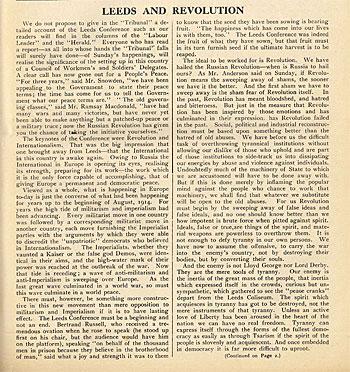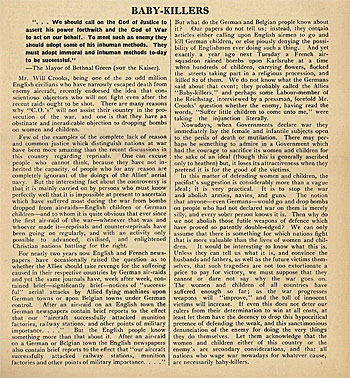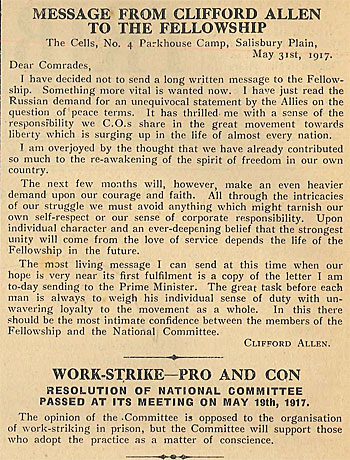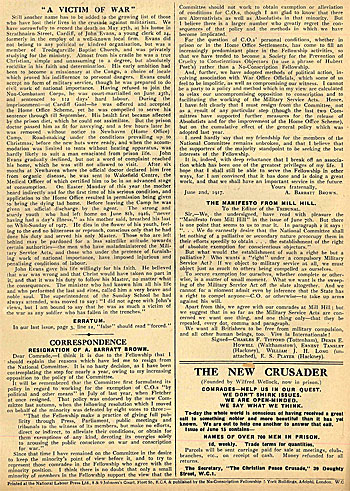
| HOME | TRIBUNAL HOME |
After a period of reflection and discussion of international issues, the beginning of June 1917 saw The Tribunal return to action on behalf of COs and pacifism. Never a newspaper concerned with either public opinion or the limits of the practically possible, June 1917 was a month of great hopes and grand gestures.
June 7th Leeds and Revolution
The first and grandest of The Tribunal’s June resolutions was to publicise the Leeds conference on the future of the labour movement in Britain and not just to call for an end to the war, but for immanent and permanent revolution! The major resolution of the conference was to set up a Council of Workmen’s and Soldier’s Delegates - a Soviet - which would act to secure the interests of the groups it represented.
If that wasn’t revolutionary enough, The NCF didn’t just attend but published statements the central government, already keeping a wary eye on The Tribunal, would find shocking - “We have hailed the Russian revolution - when is Russia to hail ours?” and “Undoubtably much of the machinery of state to which we are accustomed will have to be done away with”.
It’s occasionally easy to forget just how unusual The Tribunal really was. Far from a newspaper dutifully chronicling the sufferings of Conscientious Objectors, it was a paper calling for the abolition of the reasons for their objection - an end to war, to state coercion and the capitalist world view that caused both. It was revolutionary, in every sense of the word - and articles such as these brought the iron boot of government censorship ever closer to it’s door.
As befits a newspaper of the peace movement, however, The Tribunal did not call for armed insurrection and acknowledged that revolution would be a long and hard task. One that was “less exciting and to some less heroic than dying on the barricades” but demanded that they “live on the orange box at the street corner, on the platform of the little school that holds perhaps half a hundred people”. Not, in essence, a revolution of arms, but “the only revolution that is worthwhile - the Revolution of ideals”.
June 14th Clifford Allen in Prison
Despite the call for revolution, much of each issue in The Tribunal was still concerned with updates from Conscientious Objectors. The June 14th issue contained what was by now an irregular but important feature - news from Clifford Allen. By mid 1917 Allen was beginning his third prison sentence, this time of 2 years Hard Labour. Before being taken to Winchester, Allen sent his now customary letter to the readers of The Tribunal.
As always with these “checking in” letters, Allen is careful to strike a balance between encouragement and the reality of the situation. He is also careful to toe the party line in a way that supported the individual conscience of each CO - that “the great task before each man is always to weigh his individual sense of duty with unwavering loyalty to the movement as a whole”. Allen, the great diplomat of the CO movement, here not only places the burden of expectation on each man, but gently reminds them of a movement beyond their consciences. Act according to your conscience, of course, but think a moment of the NCF line before you do.
Alongside Allen’s letter comes a re-iteration of the NCF’s ambivalent position on work strikes. Again, the position is unclear - no to work strikes, but support to COs who undertake them. In this context, Allen’s letter becomes more transparently political, requesting that COs think of NCF policy before they act. Allen’s own position on work strikes is equally unclear. Though his letters and correspondence with COs and their supporters outside of prison undoubtably helped to shape the NCF line on striking, within months of his transfer to Winchester during his third sentence he himself would be on strike.
21st June Baby-Killers
As far as intra-movement issues go, the headline article in the 21st June issue saw The Tribunal on firmer ground, but promoting a point of view on the war that few people in the wider public, even today would agree with.
Baby-Killers discusses and decries the morality of aerial bombardment as a weapon of war. Rather than supporting the Zeppelins as a logical consequence of modern and mechanised warfare, The Tribunal convincingly argues the moral equivalence of British and German aerial warfare. 
It does so with it’s typical wry humour, attempting to counter the hyperbole of the anti-Zeppelin fervour that called for the total destruction of Germany; “Mr Will Crooks, being one of the 20 odd million English civilians who have narrowly escaped death from enemy aircraft...” and pointing out the hypocrisy of the press and public calling for Britain to adopt “immoral and inhuman methods” against Germany.
As the article states, Britain was already as guilty as Germany of deliberately bombing civilians:
“For two years now English and French news-papers have occasionally raised the question as to whether the Allies should take revenge for the suffering caused in their respective countries by German air raids and yet the same journals have, week after week, contained brief - significantly brief - notices of “successful” aerial attacks by Allied flying machines upon German towns”
Both sides killed women and children, as deliberately as each other. Revenge and retribution were not workable solutions. Peace represented the only way to guarantee that women and children would no longer be targets.
The parallels to the modern day are striking. In every war, up to and including the terrorism and counter-terrorism of the day, violence has bred violence. The conclusion of the article still rings true: “Let them acknowledge that the women and children either of this country or of the enemy’s are secondary considerations, and that all nations who wage war nowadays for whatever cause, are necessarily baby-killers”.
21st of June Resignation of A. Barratt Brown
As the NCF became more avowedly political on one hand and focused more and more on alleviating the sufferings of Conscientious Objectors on the other, divisions began to grow in the ranks. The most high-profile division in this period was of A. Barratt Brown, whose resignation notice from the National Committee of the NCF was published in The Tribunal.
Barratt Brown wanted to refocus the NCF towards national politics and the repeal of conscription seeing the official party line as an acquiescence towards the militarism that produced it. Calling for peace and acting only to support Conscientious Objectors was not enough, as it would lead, inevitably, to the NCF becoming the “Society for the Prevention of Cruelty to Conscientious Objectors”. Barratt Brown tabled the motion that would lead to his resignation - that the NCF devoted “its energies solely to arousing the public conscience on war and conscription for war” knowing that it would be in the minority, but in doing so made an important point. The ever-growing need COs had for political representation and redress of their grievances was expanding to dominate the work of the NCF.
The remaining months of 1917 would continue this trend. While running leader articles and attending conferences showed a willingness to support long term change, the die was cast and the NCF would become an organisation less concerned with repealing conscription and much more dedicated to improving the lives of Conscientious Objectors.

